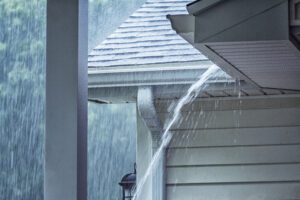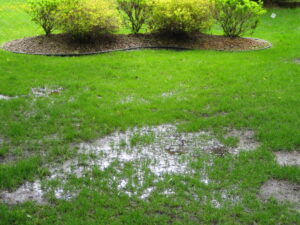Although it might not feel like it right now, spring is just around the corner! Along with the flowers and warmer weather that spring brings, it also brings a lot of rain. A large volume of rain can often lead to a flooded or overworked septic system. For this reason, it’s important to prepare your septic system for this surge of precipitation. Here are some tips to help you prepare your system for the spring.
Check your Gutters
To prepare for the excess rainfall and potential flooding of our Colorado springtime. It’s important to make sure that all gutters are facing away from the drain field and any other septic system components. Gutters that point toward your septic system will carry water to the system and lead to possible flooding of the drain field.
Check for Water Pooling
After it rains, you should watch for water pooling in your yard. There are a few different reasons for standing water in your yard, but one of the most common for septic system owners is a flooded drain field. Watch for standing water pooling in areas over your drain field in order to catch the problem before it becomes severe. If your drain field floods, it can lead to permanent damage to your system and an expensive replacement.
Check Your Tank Filter
Your tank filter is an important part of the overall functionality of your septic system. After the winter, your filter can become clogged with scum, debris, and other items left over from winter storms or spring rains. If your tank filter does become clogged, it can disrupt the overall workings of your system. For this reason, you should check your tank filter to make sure it is clear of debris to ensure that it is functioning properly.
Reduce Water Usage
If possible, reducing the water usage in your home can help reduce the stress on your septic system during the springtime. Especially after a big storm, water conservation can help prevent your system from flooding. There’s no need to take drastic steps, but small things such as running dishwashers and washing machines only at capacity and turning the faucet off while brushing your teeth or shaving can help. Reducing water usage is not necessary, but it can help lower the risk of a flooded septic system after a storm.
Clean Your Drain
When your drains or pipes in your home are clogged, it will make your septic system work harder to pump water. When your system is overworked, it can often flood. For this reason, it’s especially important in the spring to make sure that your drains are completely clear. Consider getting a professional drain cleaning or Hydro-jetting to completely blast away any scum or debris that might be clogging your pipes.
Pump Your Tank
During the wintertime, it can be often be difficult to reach your septic tank because of the frozen ground or accumulated snow pack. If your tank hasn’t been pumped in a while, you should consider pumping it early in the spring. A mostly full tank will have to work hard to perform well. When your septic system is dealing with excessive rainfall, a mostly full tank could push the system over the edge, leading to flooding, backups, and even leaking sewage in your yard. To avoid these issues, you should pump your tank early on in the springtime.
If you need help with Septic Pumping, need Septic Inspection, Septic Repair or Septic Installation. We serve Fort Collins, Loveland, Greeley, Longmont, Boulder, Windsor, Wellington, and the surrounding areas. Contact us today to schedule an appointment with an expert you can trust. (970) 510-0522

















